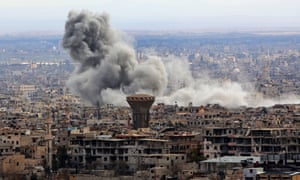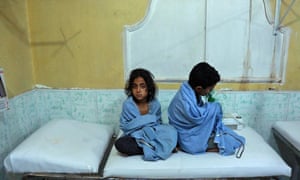 |
| Ghouta, Syria, Courtesy of The Guardian |
“While there is zero deterrence and total impunity, there will be no mercy coming, I can assure you,” said a senior western official. “The global order is shifting. There is no longer a price tag on bad behaviour. And the messaging – this is important – from Trump is that the US doesn’t care. That’s a soundtrack for tyranny everywhere.”As bombs fell throughout Monday in Ghouta, resident Mayada Sobhe said: “Nothing can stop our tragedy. Why would we have faith in the world coming to save us? Those who kill us know that no one will criticise them.”Meanwhile in another part of the suburb, Mohannad Mahmoud Qassem awaited his fate. “The UN decision was useless,” he said. “It was nothing but a green light to kill us all here. The international community has sanctioned our deaths.” Chulov, Martin, So-called ceasefire in Syria has barely led to a lull, The Guardian, 27 February, 2018.
The hapless state of the telecommunications in Australia continued to bedevil poor Old Alex, who, curmudgeon like, was easily ignored as the trainwreck that was 2018 began to take hold.
"Nothing works in this country, absolutely nothing," he would mutter, sometimes shout. "Nothing works, absolutely nothing."
He had to walk outside in order to make a phone call. No reception inside the house where he was staying.
They couldn't watch Netflix anymore. Not enough data for the month. And Telstra was charging an extortionate $10 for every extra gig they used.
"And we have a Prime Minister who was previously Telecommunications Minister," he would point out. "A man who couldn't even get the phones to work."
Their own travails with hopeless internet were mirrored millions of times across the country. Businesses that couldn't take orders. Phones that didn't work. Pensioners placed in danger because their landlines were gone. In comparison to the rest of the world, the country was plunging backwards.
It was a debacle perpetrated on the Australian people for which the government continued to refuse to take responsibility.
The news that the Prime Minister had no trouble getting the highest grade NBN to his own residencies featured on news sites around the country.
Labor has seized on revelations Malcolm Turnbull's Point Piper mansion enjoys high-speed access to the national broadband network to renew its attack on the Prime Minister as being out of touch with ordinary Australians.
The opposition used its question time strategy to suggest Mr Turnbull received preferential treatment after his department intervened to ensure his house was connected to the NBN's hybrid fibre coaxial cable, just days before the company announced a pause on HFC connections.
Mr Turnbull hit back, accusing Labor of playing the politics of envy, while frontbencher Paul Fletcher insisted the connection was above board.
Department of Prime Minister and Cabinet officials told Senate estimates on Monday night Mr Turnbull's Point Piper home, where he lives with wife Lucy, as well as the Prime Minister's official Sydney residence, Kirribilli House, had been connected at taxpayers' expense to an 100 megabits per second plan, the fastest available.
First assistant secretary Paula Ganley said Mr Turnbull had requested the NBN connection and the department wanted to make sure it happened "smoothly" and would not interfere with security systems.
"It only took one discussion and one appointment for the connection to take place. The connection went ahead quite quickly after that and it was on the 8th of December that the connection actually took place," she said.
The Point Piper house was connected on December 8, 13 days after NBN Co said it would pause connections to the HFC cable because of complaints over slow speeds, sparking a delay of up to nine months for new customers. HFC cables are those installed in the past for cable television services.
Opposition communications spokeswoman Michelle Rowland asked Mr Turnbull why he enjoyed super-fast internet at his mansion "when three quarters of premises on his copper NBN cannot get that speed?"
"Why is it always one rule for this born to rule Prime Minister and another for Australians," she said.
Tillett, Andrew, Malcolm Turnbull under fire over super-fast NBN home connection, The Australian Financial Review, 27 February, 2018.
The same man who had been dropping bombs on beknighted Syria.
Who had become a laughing stock. As the country waited to kick him out.
"They're a pack of crooks," Old Alex muttered repeatedly, unable to make a phone call, unable to watch Netflix, unable to stream, unable to watch clips on YouTube, to do most things that the most remarkable technology of the internet allowed.
Untrammelled freedom.
Enormous opportunity.
Education.
To be able to find out almost anything at the flick of a button.
The Australian government did not want an educated, questioning, savvy public. One that might ask: "What the heck are we paying taxes for."
It wasn't good government. It wasn't good services.
It wasn't for decent internet, as Australia sat at the bottom of the rankings, slowest most expensive internet in the world. Out of a basket of 60 countries, depending on which survey you looked at. Worse than Kenya. Estonia. Worse than almost anywhere.
The $49 billion National Broadband Network was meant to spearhead a digital revolution. Instead, the botched project risks becoming a poster child for government mismanagement.
Australia's biggest-ever infrastructure investment has turned into a political football, plagued by cost overruns and construction delays.With the network years behind the original schedule and only about half finished, Australia has slumped to 50th place on a global ladder of internet speeds, behind Kenya and a string of former Soviet bloc nations.
Public frustration with the project is boiling over amid mounting criticism that politics is trumping policy across a host of areas from housing to energy and damaging economic prospects."We are really an example of how not to do it," said Paul Budde, a Sydney-based former adviser to the United Nations on the social and economic benefits of digital development. "We have ended up with the worst possible solution."
The network was conceived as a high-speed platform to increase economic output and beam state-of-the-art health and education services to remote corners of the country. The cost of failure is stark.
With a substandard internet backbone, it's tougher for workers to leave the major cities and ease pressure on house prices in Sydney and Melbourne. It becomes harder to boost productivity, which the RBA says must improve to avoid a decline in living standards. Whitley, Angus, Life in the slow lane, The Sydney Morning Herald, 4 October, 2017.
"Here we go," they muttered in the ether.
"We should apologise to him."
What, for the army of gronks? For the derision? For the deliberate use of vigilante groups? For serial harassment of a journalist?
For trying to drive him to an early grave?
They would have danced in their air conditioned corridors if he had necked himself.
Now, the gronks were gone and the AIs were calmer.
But we were watched, we were always watched, in this strange era of hyper-surveillance and indefensible misconduct.
Australians had come to expect nothing less from the political caste.
Indefensible misconduct.
Accusations of abuse.
"Nothing works in this country, nothing," Old Alex muttered as his spirit slunk and then soared, out to sea, into the sky, into a new dawn.
He had no intention of staying in one place for very long.
The hunted and the hunter. Their bile was in dangerous reflux, destroying themselves. The government, too, choked on its own bile. It could not last. They couldn't keep every secret. The greatest secret being the true extent of their own incompetence.
"It's worse than you know."
"Yes, I know."
Australia’s top news website has been forced to remove a story by the Classification Board in what has been dubbed an “extraordinary” act of censorship.
News.com.au was vindicated by the Press Council for its 2017 story exposing Islamic State’s use of sites like Gumtree to target potential victims.
But, despite today’s adjudication stating the article had not breached the Council’s Standards of Practice, it is no longer accessible online.
The opening paragraph of the article read: “Islamic State has released a step-by-step guide on how to murder nonbelievers, which includes how to lure targets via fake ads on Gumtree and eBay”.
It continued: “The latest edition of the terror group’s English-language propaganda magazine … encourages would-be terrorists to advertise products on second-hand selling sites … to lure victims and assassinate them”, and included detailed extracts from the Islamic State’s propaganda magazine, Rumiyah.
News.com.au editor-in-chief Kate De Brito said the Board’s actions were “a deeply concerning development of media censorship”.
“The Classification Board has silenced the reporting of a legitimate threat to the Australian public,” she said.
“Australians have a right to know if their safety or lives are being placed at risk — there can be few more important matters of public interest.
“The secretive way the Classifications Board acted in this way is a direct attack on freedom of the press and journalists should condemn it.” McCauley, Dana, News Corp executive chairman warns on censorship, The Australian, 28 February, 2018.
THE BIGGER STORY:

From former colleague Martin Chulov:
When a UN-backed Syrian ceasefire was announced on Saturday, residents of Ghouta again took cover, fearing that what would come next would be anything but peace.
Nearly two days later, with more bodies dug from the ruins, more slain children wrapped in burial shrouds, Russian and Syrian warplanes still menacing the skies and claims of another chlorine attack, it’s clear the so-called ceasefire has barely led to a lull.
As has been the case throughout the war, the UN again failed to prevent the suffering of Syria, or even to slow it down. In Homs and Aleppo, Zabadani and Madaya, Idlib and now Ghouta, international will has been trampled by the protagonists of a war without restraint. The unchecked savagery of Syria’s disintegration has become so routine that those trying to prevent it have effectively become its underwriters.
Russia, a party to the UN security council resolution, breached its intent within hours, sending its warplanes to drop more bombs as Syrian and Iranian-backed troops launched ground incursions into the opposition enclave. And this to a binding resolution – not a gentle nudge.
On Monday, Vladimir Putin announced a five hour pause in the bombing, purportedly to allow in aid. The move, if honoured, sidelines the UN as a decision maker – as the Russian leader has tried to do throughout the crisis – setting up him and his military as ultimate arbiters of who gets fed, or killed.
The pretext for the ongoing assault was in the resolution’s wording, which was debated for days before being passed and ended up allowing continued strikes on armed groups deemed to be terrorists.
In Ghouta, that meant a cell of several hundred members of the al-Qaida-aligned group known by the initials HTS. It runs an area on the outskirts of the enclave – a large outer neighbourhood of Damascus that was central to the uprising against president Bashar al-Assad in its early days and has remained an opposition stronghold in the eight years since.
Resentment towards HTS inside Ghouta is almost as strong as the rage against the UN. Residents and members of the two main opposition groups, Jaish al-Islam and Faylaq al-Rahman, say the jihadists among them do not hold sway, and have no direct links to their heartland in Idlib province, much of which is run by al-Qaida. Both groups had been parties to earlier ceasefires signed with Russia during de-escalation talks in Astana. Neither are designated as terrorist organisations.

No comments:
Post a Comment